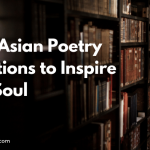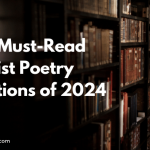Table of Contents
- Introduction
- 1. “Twenty Love Poems and a Song of Despair” by Pablo Neruda
- 2. “The Essential Neruda: Selected Poems” by Pablo Neruda
- 3. “The Book of Questions” by Pablo Neruda
- 4. “The Posthumous Poems” by Gabriela Mistral
- 5. “The Complete Poems” by Octavio Paz
- 6. “The Collected Poems” by Hilda Doolittle
- 7. “In the Midst of Winter” by Mario Benedetti
- Conclusion
Introduction
Latin American poetry is a treasure trove of emotions, history, and culture. From the passionate verses of Pablo Neruda to the poignant reflections of Gabriela Mistral, these poets have given voice to the complexities of life and love in their unique styles. As we step into 2024 and beyond, these seven collections are essential reads that capture the essence of Latin American literature and its evolving narrative.
1. “Twenty Love Poems and a Song of Despair” by Pablo Neruda
Pablo Neruda is often regarded as one of the greatest poets of the 20th century, and this collection is a perfect introduction to his work. Published in 1924, “Twenty Love Poems and a Song of Despair” encapsulates the passionate and tumultuous nature of love.
Highlights
- Theme of Love: The poems explore the highs and lows of romantic love, articulating the feelings of desire, longing, and heartbreak.
- Imagery: Neruda’s use of vivid imagery evokes the landscapes of Chile and the sensuality of the human experience.
“In this collection, Neruda takes the reader on a journey through the landscapes of love, where each poem serves as a vivid snapshot of emotion.”
Why Read It?
This collection resonates with anyone who has loved and lost, making it a staple in the world of poetry. For a deeper exploration of Neruda’s work, don’t miss The Essential Neruda.
2. “The Essential Neruda: Selected Poems” by Pablo Neruda
This carefully curated selection features some of Neruda’s most celebrated works, allowing readers to experience the breadth of his poetic genius.
Highlights
- Diverse Themes: The collection covers a range of topics from love and nature to politics and human rights, showcasing Neruda’s versatility.
- Accessible Language: The poems are translated into English with care, preserving the lyrical quality of the original Spanish.
“A collection that distills the essence of Neruda’s genius, making it accessible for both new and seasoned poetry lovers.”
Why Read It?
“The Essential Neruda” is perfect for those who want a comprehensive view of his work without diving into the entirety of his oeuvre. You can explore more about his impact on poetry through Poets.org.
3. “The Book of Questions” by Pablo Neruda
In this unique collection, Neruda poses profound questions that provoke thought and reflection.
Highlights
- Philosophical Depth: Each poem is a meditation on existence, inviting readers to ponder the mysteries of life.
- Simple Yet Profound: The straightforward language belies the complexity of the questions raised.
“Neruda turns the act of questioning into an art form, prompting readers to seek their own answers within.”
Why Read It?
This collection encourages introspection and sparks curiosity. It’s an excellent choice for readers who appreciate poetry that challenges the mind. For more insights into Neruda’s philosophy, visit The Poetry Foundation.
4. “The Posthumous Poems” by Gabriela Mistral
Gabriela Mistral, the first Latin American woman to win the Nobel Prize in Literature, delivers a powerful collection that reflects her deep emotional landscape.
Highlights
- Themes of Grief and Love: These poems often address loss, motherhood, and the search for meaning, making them deeply relatable.
- Cultural Context: Mistral’s work is steeped in the traditions of her Chilean heritage.
“Mistral’s poetry serves as a testament to the resilience of the human spirit, navigating the complexities of love and loss.”
Why Read It?
Mistral’s poignant exploration of human emotions makes “The Posthumous Poems” a touching read. Discover more about her life and influence at the Nobel Prize website.
5. “The Complete Poems” by Octavio Paz
Octavio Paz’s “The Complete Poems” is an extensive collection that showcases the evolution of his poetic voice over several decades.
Highlights
- Varied Styles: Paz experiments with form and structure, incorporating free verse, sonnets, and more.
- Cultural Critique: His poetry often reflects on Mexican culture and identity, making it a rich text for cultural studies.
“Paz’s work is a mirror reflecting the societal complexities of Mexico, intricately woven with personal introspection.”
Why Read It?
This collection is essential for anyone interested in modern poetry and its intersection with politics and identity. For further reading, check out Octavio Paz’s biography.
6. “The Collected Poems” by Hilda Doolittle
Although Hilda Doolittle, known as H.D., is often associated with the Imagist movement, her work transcends any single genre.
Highlights
- Imagery and Precision: Doolittle’s poems are characterized by their vivid imagery and precise language, often drawing from myth and nature.
- Feminist Themes: Her exploration of gender and identity adds a rich layer to her poetry.
“H.D. crafts a world where myth intersects with the modern, providing a unique lens on identity and societal roles.”
Why Read It?
H.D.’s work is a must-read for those interested in feminist literature and Imagism. For a deeper dive into her influence on modern poetry, visit The Academy of American Poets.
7. “In the Midst of Winter” by Mario Benedetti
Benedetti’s “In the Midst of Winter” is a beautiful reflection on love and life’s challenges, marked by his signature simplicity and emotional depth.
Highlights
- Everyday Life: The poems capture the beauty found in the mundane, making them relatable to everyday experiences.
- Exploration of Human Connection: Benedetti’s ability to articulate complex emotions makes this collection stand out.
“Benedetti reminds us that even in the depths of winter, warmth can be found in love and human connection.”
Why Read It?
This collection is perfect for readers who appreciate accessible yet profound poetry. You can learn more about Benedetti’s impact on Latin American literature through The Mario Benedetti Foundation.
Conclusion
Latin American poetry is rich with emotion, culture, and history. The collections discussed here offer a diverse range of voices and themes, making them essential reads for anyone interested in exploring this vibrant literary landscape. Whether you’re seeking passion, introspection, or cultural critique, these poets have something profound to share.
“By diving into these works, you embark on a journey through the depths of human experience, beautifully captured in verse.”
So, grab a cup of coffee, find a cozy spot, and dive into the world of Latin American poetry! By exploring these collections, you not only enrich your understanding of literature but also connect with the universal experiences that define our humanity. Happy reading!




